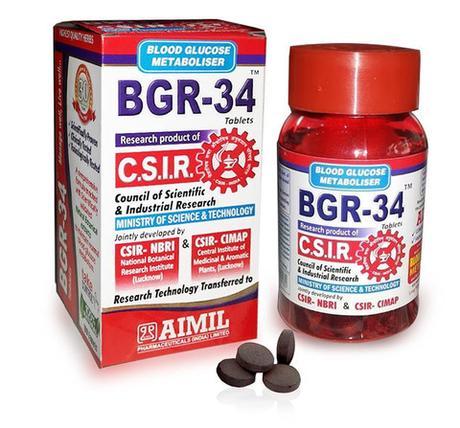An herbal drug, developed jointly by the National Botanical Research Institute (NBRI) and the Central Institute of Medicinal and Aromatic Plants (CIMAP), branded as BGR-34, has been commercialized by Delhi-based Aimil Pharmaceuticals and marketed as a potentially side-effect free treatment for diabetes. However, a search for publications outlining trials conducted to support the claimed “67% success rate”, came up empty for me. And I am not the only one, as it appears that there have been several outlets questioning the veracity of these incredible numbers.
The online magazine The Wire states:
The literature published by AIMIL Pharmaceuticals quotes a number of studies performed on the different components of BGR-34 – daruharidra, vijaysar, methi, gudmar, giloe and majeeth – and quoting various sources, although CSIR, NBRI and CIMAP aren’t among them. Upon looking up the websites of these organisations, there is no specific literature available on the research undertaken by these organisations leading to BGR-34.
It provides the following accompanying table highlighting the evidence:
Berberis aristata (Daruharidra)
- Improves Insulin action by activating AMPK
- Increases insulin secretion and improves oral glucose tolerance
- high DPP-IV inhibitory potential
- Restored reduced glutathione content
Pterocarpus marsupium (Vijaysar)
- Repairs & Revives ß-cells, Enhances Insulin Release
- Converts Pro-insulin to insulin
- A multicentric trial
Trigonella foenum-graecum, Methi
- Activates insulin receptor substrate
- Normalises Post Prandial Hyperglycemia
- Reduces intestinal absorption of glucose
- Inhibits activity of α-amylase & α-glucosidase
- Stimulates insulin release from β-cells
Gymnema sylvestre (Gudmar)
Tinospora cordifolia (Giloe)
Rubia cordifolia (Majeeth)
- Controls Alpha amylase and glucosidase

Another skeptical article in LiveMint highlights the concern that should bug many a medical practitioner:
“Herbal medicines are not cheap, we don’t know the long-term side-effects of these drugs, the mechanism of action; there is hardly any data available, and we hear these things from newspapers over reputed scientific journals,” said Shyam Kalavalapalli, a Hyderabad-based endocrinologist. Contrary to the claims of no side-effects, herbal medicines were found to have high concentrations of heavy metals in many studies, Kalavalapalli said.
At five bucks a tablet, with four tablets to be taken daily, this is not a cheap alternative. Many generic drugs, like Metformin and some of the sulfonylureas, are likely to be cheaper, more intensely researched, and have more well-understood adverse effect profiles. Apparently, the drug has been approved by the Ministry of AYUSH, lending it a seal of credibility.
Now personally, I have nothing against the movement of mainstreaming AYUSH practitioners into the public and clinical health system in India. If anything, I believe that given the desperate shortage of doctors we face, maybe this might be a good move to balance out the doctor:patient ratio disparity in rural areas. But I will not go into it as it is a debate for another day. I am truly concerned about the fact that when I search for information on this drug, all I get is marketing material, and no hard science. The lack of published, peer reviewed, double-blinded, controlled trials proving the veracity of the claims being made by the drug makers is seriously damaging to the credibility of the AYUSH practitioners. The alternative medicine practitioners have been getting more attention thanks to the support being lent to them through the health system. But if they fail to come up with credible evidence to support their incredible claims, it just makes them look more like pseudoscientific practitioners than anything else.
Now if you go online and look hard enough, you will find stories both for and against the effectiveness of the medication. But that is NOT how science works! Personal narratives and anecdotes, though they come with the personal touch that makes it easy to convince people, should not dictate the standards for determining drug approval processes.
With an estimated 62 million adult diabetics, almost 1 in 14 adult Indians are diabetic. Second only to China, India adds 2 million diabetics every year to its burden of morbidity. It is expected that by 2030, India will have crossed the 100 million mark for diabetic patients! With such numbers, it is hardly a wonder that India has earned the unenviable epithet of being the diabetes capital of the world. Add to that the affinity of people for things like “natural cure” and “herbal drugs” and “side effect free”, and we have a dangerous combination. (Data Source: CCEBDM, PHFI)
As a public health skeptic, I demand to see the evidence, the data that goes behind such a massive declaration. The LiveMint article highlights another comment which worries me no ends:
Aimil Pharmaceuticals said the drug will be sold in Delhi and Himachal Pradesh to begin with, and later in the rest of the country. It has already been approved for sale in Delhi and Himachal Pradesh. “We are planning to reach around 100,000 doctors through 800 medical representatives to explain the benefits of our drug,” said Anil Kumar Sharma, vice president of Aimil Pharmaceuticals.
If this is true, then it is time that as educated consumers, we must demand the data. If we do not judge the merits of what we use to treat ourselves based on cold, hard facts, then we are fooling ourselves, and all I can say is caveat emptor!
Disclaimer: It is possible that I have missed out on the published data if it has been recently published or published in a journal which is not indexed or one which is indexed with an agency I did not look into. If that is the case, please point me in the right direction. I shall look up the data and analyze and comment on it. I tried searching the major databases for the drug but came up empty.
